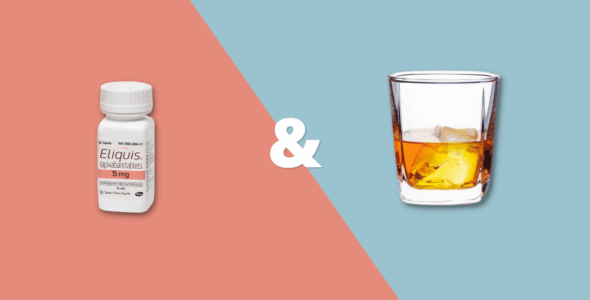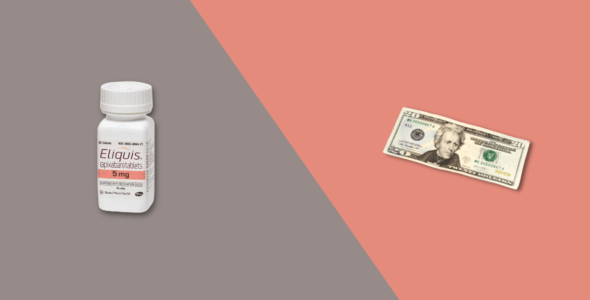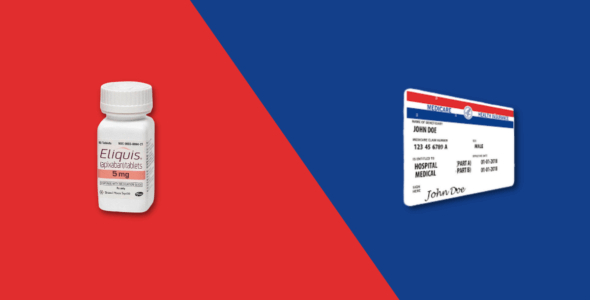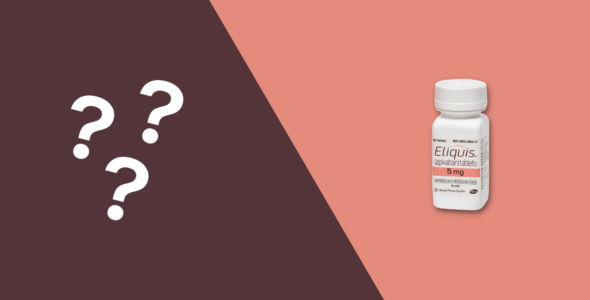Eliquis Coupon & Prices
Complete a free online enrollment application to find out if you’re eligible to pay only $49 per month for your Eliquis medication with our help.
Get Started Now- Secure: Your personal and medical information is safe with us
- Convenient: We manage the whole process and we’re here to assist you
- Ongoing refills: We request your medication refills on your behalf
- Secure: Your personal and medical information is safe with us
- Convenient: We manage the whole process and we’re here to assist you
- Ongoing refills: We request your medication refills on your behalf
NiceRx works with your healthcare provider to help you access affordable medications directly from U.S. pharmaceutical companies.
How it works
Enroll online
Get started by filling out the online enrollment application to find out if you are eligible for assistance.
Pre-qualification
NiceRx verifies your eligibility for medication assistance and notifies you if you are pre-qualified. The pharmaceutical company provides your medication for free, and you only pay our service fee.
Submit documents
We will request documents to be submitted by you and your healthcare provider that are required by the pharmaceutical company to complete your enrollment.
Receive medication
Once approved, the pharmaceutical company typically ships a 90-day supply of medication to your home or healthcare provider’s address. Final acceptance is determined by the pharmaceutical company.
Do you need assistance to pay for Eliquis medication? With the help of NiceRx, you may be able to get Eliquis for just $49 per month.*
NiceRx works directly with your healthcare provider. We help you to enroll in the Eliquis patient assistance program, by handling the full application process on your behalf. With NiceRx you can get regular access to affordable Eliquis medication without any hassle and stress.
Your monthly Eliquis cost savings if eligible
You can receive your Eliquis prescription for a flat fee of just $49 per month. This flat fee is paid every month and covers the full cost of your Eliquis medicine, regardless of the retail price. You may be able to save:
| Strength | Avg. monthly price at a US pharmacy | NiceRx monthly price | Monthly savings with NiceRx |
|---|---|---|---|
| 2.5mg 60 tablets | $216.00 | $49.00 | $167.00 |
| 5mg 60 tablets | $216.00 | $49.00 | $167.00 |
Am I eligible for the Eliquis patient assistance program?
If you meet the eligibility criteria, you could receive your Eliquis without paying the full retail price. We review each Eliquis assistance program application individually, although the main factors considered by most programs are:
- I am a permanent, legal resident of the United States or Puerto Rico
- I am uninsured or my insurance doesn’t cover my medication
- I meet certain income eligibility requirements
How do I apply for the Eliquis patient assistance program?
NiceRx takes the stress out of applying for the Eliquis patient assistance program. Fill in our enrollment application, and tell us about any medications you’re taking, including Eliquis. We’ll ask for specific details about your healthcare provider, your insurance, and your household income as this is needed by the pharmaceutical manufacturers who ship your medication.
If we determine that you may be eligible for assistance having reviewed your individual information, we’ll help to enroll you in the Eliquis patient assistance program and handle the full application process. Once you are enrolled in the program, NiceRx will request your Eliquis medication refills on your behalf for up to 1 year.
Is NiceRx an Eliquis coupon provider?
We are not an Eliquis coupon or an Eliquis discount card. NiceRx does not offer printable Eliquis coupons, Eliquis manufacturer coupons, Eliquis discount coupons, rebates, Eliquis savings cards, trial offers, free Eliquis, or free samples of Eliquis.
We are a service provider that helps eligible individuals access the Eliquis patient assistance program. When obtaining your Eliquis medication through NiceRx, your total cost for the medication will always be $49 per month. This is likely to be much cheaper than coupons.
Can NiceRx help me get Eliquis cheaper if I have insurance?
If for any reason your insurance company won’t pay for your Eliquis medication, you have a high copay or coinsurance responsibility or don’t have insurance, we may be able to help.
How much is Eliquis with insurance?
The cost of Eliquis will often vary by the healthcare plan. Your healthcare provider or pharmacist will be able to calculate your copay with your current insurance. Remember, you’ll likely save money if you get your Eliquis medication through NiceRx, if you’re approved for assistance.
How much is Eliquis without insurance?
Eliquis prices without insurance will vary depending on where you buy it and the number of tablets there are per pack. You can expect to pay around $500 for a pack of 60 Eliquis tablets, and around $830 for 100 tablets. With NiceRx you’ll always pay a flat monthly fee of $49.
What is Eliquis?
Eliquis is an anticoagulant, a type of drug that stops blood clotting (turning from a liquid to a thick gel). The medication is used to prevent blood clots forming in people who have:
- Nonvalvular atrial fibrillation (an irregular heartbeat not caused by a heart valve problem) and who have other clotting risk factors
- Had hip or knee replacement surgery
It’s also used to treat blood clots in legs (deep vein thrombosis) and lungs (pulmonary embolism), and to stop blood clots reoccurring in these places.
Blood clotting is a normal process that happens when you’re injured. If you cut yourself, a clot forms to seal the cut to stop you from losing any more blood. But sometimes blood can clot inside your body where it shouldn’t, and this can cause problems. Clots can block the flow of blood, starving parts of the body of oxygen, and damaging tissues. Depending on where blood clots form, they can cause deep vein thrombosis, heart attacks, and strokes. Sometimes Eliquis is called a blood thinner, as it helps to lower the chances of blood clots forming.
What doses of Eliquis are available?
Eliquis is available in tablet form, in the following doses: 2.5 mg and 5 mg.
The recommended dose of Eliquis is 5 mg orally twice daily. For patients 80 years of age or older, weighing 60 kg or less, or having serum creatinine equal to or above 1.5 mg/dL, the recommended dose is 2.5 mg orally twice daily. Always speak with a healthcare professional about any changes to your dose so they can monitor and evaluate your condition.
Eliquis active ingredients
The active ingredient in Eliquis is an anticoagulant called apixaban. As blood clots, it goes through a process of chemical reactions that turns it from a liquid into a thick gel. An enzyme called factor Xa is an important part of this process. Eliquis targets this. The active ingredient apixaban attaches to factor Xa to stop it from working, reducing the likelihood of blood clots forming.
Eliquis side effects & drug interactions
Eliquis can have side effects, although not everyone will experience them, or have the same ones. Most side effects caused by Eliquis are related to increased bleeding, as the medication prevents clotting. These side effects include anemia, increased bruising, blood in your urine and feces, and bleeding from your orifices, like your anus or vagina.
This isn’t a comprehensive list of all the side effects Eliquis can cause. Side effects depend on the dose you’re taking and the condition you’re taking Eliquis for. You can find more details on the side effects in the patient leaflet that comes with your medication. If you have any concerns about Eliquis’ side effects, talk to your physician or a pharmacist.
Eliquis and other medications can interact with each other. These interactions can change how the drugs work and can make side effects more likely. Don’t take Eliquis if you’re taking any other medications to prevent blood clotting, like warfarin. Talk to your physician if you’re taking any of the following:
- An antifungal medicine
- Antiviral medicines for HIV/AIDS
- Anti-inflammatory medicines
- Pain medications
- Medicines for high blood pressure or heart problems
- Antidepressants
- Medicines to prevent epilepsy or seizures
- Medicines to treat tuberculosis
- St John’s Wort
Make sure you tell your prescribing physician about all medications you’re taking, including supplements, even if they aren’t in the list above.
Eliquis warnings & precautions
Don’t take Eliquis if you:
- Are allergic to the active ingredient apixaban
- Are allergic to any of the other ingredients found in Eliquis (listed in the leaflet which comes with the medication)
- Have artificial heart valves
- Have antiphospholipid syndrome (APS), especially with positive triple antibody testing, and have a history of blood clots
- Are under 18 years of age
- Are bleeding excessively
- Have an organ condition that increases the likelihood of serious internal bleeding, like a stomach ulcer
The effects of Eliquis on unborn children are unknown. It’s also not known if Eliquis passes into breast milk. Talk to your physician or a pharmacist if you’re pregnant or breastfeeding.
Eliquis can impair your ability to drive or use machines.
Talk to your physician before taking Eliquis if you:
- Have an increased risk of bleeding, such as a bleeding disorder or very high blood pressure
- Are over 75 years of age
- Weigh 60kg or less
- Have a severe kidney disease or are on dialysis
- Have a liver problem or a history of liver problems
- Had a catheter or an injection into your spine
- Have antiphospholipid syndrome
- Are lactose intolerant
- Need to have surgery or another procedure that can cause bleeding
Eliquis generic
Eliquis is the trademark brand name for apixaban manufactured by Bristol-Myers Squibb Company. Generic Eliquis is not yet available however it may become available as the Eliquis generic name apixaban when the brand name manufacturer’s patent expires in 2026. Generic drugs are generally cheaper than brand-name drugs, but you can still save on this medication through NiceRx. Get started and find out how to get Eliquis cheaper from NiceRx.
Eliquis manufacturer coupon
Prescription drug coupons are provided by manufacturers to help individuals save on their medications. Sign up to find out if you are eligible to receive a Co-Pay Card and pay up to $10 per month for your Eliquis prescription for up to 24 months from the time of activation, up to an annual maximum benefit of $6,400. To find out if you are eligible, view details and read the requirements carefully to ensure you are qualified.
Related medications
Related conditions
Eliquis research & news
*Qualifying persons may obtain medications directly from patient assistance programs without any out-of-pocket cost (or for less than $49 per medication). However, our monthly flat rate of just $49 per medication spares you the hassle of tracking the different programs and filling out all the required paperwork for each program. Subject to medication availability and acceptance by the pharmaceutical companies. NiceRx is not responsible for any delays or rejection by the pharmaceutical companies.
Enrollees enjoy a full-service solution, as NiceRx assists them and their physicians with the entire process. We prepare all required documents for the physician to sign, help enrollees manage all prescription refills, monitor eligibility criteria, and maintain enrollment.
**If you do not receive medications because you were determined to be ineligible for the prescription assistance by the applicable pharmaceutical companies and you have a letter of denial, we will refund any fees you paid toward medications for which you did not qualify to receive prescription assistance (“Refund”).
To receive a refund, you must send the letter of denial to us by fax to 888-517-7444, or by e-mail to [email protected] within 30 days of your receipt of such letter. The Refund is your sole and exclusive remedy for any fees you may wish to dispute.
The content on this website is intended for information purposes only. It does not constitute medical advice. The information on this website should not be relied upon and is not a substitute for professional medical advice. You should always speak to your doctor regarding the risks and benefits of any treatment.



